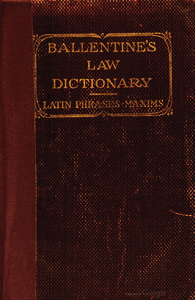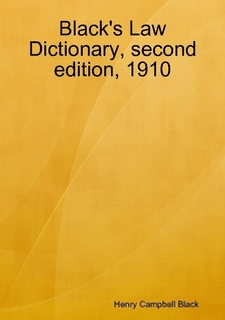A thing done or established. A statute.
Definition of Act
-
Ballentine's Law Dictionary
-
Black's Law Dictionary: 2nd Edition
n. In Its most general sense, this noun signifies something done voluntarily by a person; the exercise of an individual's power; an effect produced in the external world by an exercise of the power of a person objectively, prompted by intention, and proximately caused by a motion of the will. In a more technical sense, it means something done voluntarliy by a person, and of such a nature that contain legal consequences attach to it. Duncan v. Landis, 106 Fed. 839, 45 C. C. A. 666. Thus a grantor acknowledges the conveyance to be his "act and deed," the terms being synonymous. In the civil larw. An act is a writing which states in a legal form that a thing has been said, done, or agreed. Merl. Repert. In practice. Anything done by a court and reduced to writing; a decree, judgment, resolve, rule, order, or other judicial proceeding. In Scotch law, the orders and decrees of a court, and in French and German law, all the records and documents in an action, are called "acts." In legislation. A written law, formally ordained or passed by the legislative power of a sinte, called in England an 'act of parliament," and in the United States an "act of congress," or of the "legislature;" a statute. People v. Tiphaine, 3 Parker, Cr. R. (N. Y.) 241; United States v. Smith, 27 Fed. Cas. 1167. Acts are either public or private. Public acts (also called general acts, or general statutes, or statutes at large) are those which relate to the community generally, or establish a universal rule for the governance of the whole body politic. Private acts (formerly called special, Co. Litt. 126a) are those which relate either to particular persons (personal acts) or to particular places, (local acts,) or which operate only upon specified individuals or their private concerns. In Scotch practice. An abbreviation of ' actor, (proctor or advocate, especially for a plaintiff or pursuer,) used in records. "Act. A. Alt. B." an abbreviation of Actor, A. Alter, B.; that is, for the pursuer or plaintiff, A., for the defender, B. 1 Broun, 336, note.
—Act book. In Scotch practice. The minute book of a court. 1 Swin. 81.
—Act in pais. An act done or performed out of court, and not a matter of record. A deed or an assurance transacted between two or more private persons in the country, that is, according to the old common law, upon the very spot to be transferred, is matter in pais. 2 Bl. Comm. 294.
—Act of attainder. A legislative act, attainting a person. See Attainder.
—Act of bankruptcy. Any act which renders a person liable to be proceeded against as a bankrupt, or for which he may be adjudged bankrupt. These acts are usually defined and classified in statutes on the subject. Duncan v. Landis, 196 Fed. 839, 45 O. C. A. 666; In re Chapman (D. Ct) 99 Fed. 395.
—Act of curatory. In, Scotch law. The act extracted by the clerk, upon any one's acceptance of being curator. Forb. Inst. pt. 1, hi 1, c. 2, tit. 2. 2 Karnes, Eq. 291. Corresponding with the order for the appointment of a guardian, in English and American practice.
—Act of God. Inevitable accident; vis major. Any misadventure or casualty is said to be caused by the "act of God" when it happens by the direct, immediate, and exclusive operation of the forces of nature, uncontrolled or uninfluenced by the power of man and without human intervention, and is of such a character that it could not have been prevented or escaped from by any amount of foresight or prudence, or by any reasonable degree of care or diligence, or by the nid of any appliances which the situation of the party might reasonably require him to use. Inevitable accident, or casualty; any accident produced by any physical cause which is irresistible, such as lightning, tempests, perils of the seas, an inundation, or earthquake; and also the sudden illness or death of persons. New Brunswick, etc., Transp Co., v. Tiers, 24 N, J. Law, 714, 64 Am. Dee, 394; Williams v. Grant, 1 Conn. 487, 7 Am. Dec. 235 ; Hays v. Kennedy, 41 Pa. 378, 80 Am. Dec. 627; Merritt v. Earle, 29 N. if. 115, 86 Am. Dec. 292; Story, Bailm. § 25; 2 Bl. Comm. 122 ; Broom, Max. 108.
—Act of grace. In Scotch law. A term applied to the act of 1696, c. 32, by which it was provided that where a person imprisoned for a civil debt is so poor that he cannot aliment [maintain] himself, and will make oath to that effect, it shall be in the power of the magistrates to cause the creditor by whom he is incarcerated to provide an aliment for him, or consent to his liberation ; which, if the creditor delay to do for 10 days, the magistrate is authorized to set the debtor at liberty. Bell. The term is often used to designate a general act of parliament, originating with the crown, such as has often been passed at the commencement of a new reign, or at the close of a period of civil troubles, declaring pardon or amnesty to numerous offenders. Abbott.
—Act of honor. When a bill has been protested, and a third person wishes to take it up, or accept it, for honor of one or more of the parties, the notary draws up an instrument, evidencing the transaction, called by this name.
—Act of indemnity. A statute by which those who have committed illegal acts which subject them to penalties are protected from the consequences of such acts.
—Act of insolvency. Within the meaning of the national currency act, an act of insolvency is an act which shows the bank to be insolvent; such as non-payment of its circulating notes, bills of exchange, or certificates of deposit; failure to make good the impairment of capital, or to keep good its surplus or reserve; in fact, any act which shows that the bank is unable to meet its liabilities as they mature, or to perform those duties which the law imposes for the purpose of sustaining its credit. In re Manufacturers' Nat. Bank, 5 Biss. 504, Fed. Cas. No. 9,051; Hayden v. Chemical Nat. Bank, 84 Fed. 874, 28 C. C. A. 548,
—Act of law. The operation of fixed legal rules upon given facis or occurrences, producing consequences independent of the design or will of the parties concerned; as distinguished from "act of parties." Also an act performed by judicial authority which prevents or precludes a party from fulfilling a contract or other engagement. Taylor v. Taintor, 16 Wnil. 366, 21 L. Ed. 287.
—Act of parliament. A statute, law, or edict, made by the British sovereign, with the advice and consent of the lords spiritual and temporal, and the commons, in parliament assembled. Acts of parliament form the leges scripta, i. e., the written laws of the kingdom.
—Act of providence. An accident against which ordinary skill and foresight could not guard. McCoy v. Danley, 20 Pa. 91, 57 Am. Dec. 680. Equivalent to "act of God," see supra.
—Act of sale. In Louisiana law. An official record of a sale of property, made by a notary who writes down the agreement of the parties as stated by them, and which is then signed by the parties and attested by witnesses. Hodge v. Palms, 117 Fed. 396, 54 C. C. A. 570.
—Act of settlement. The statute (12 & 13 Wm. III. a 2) limiting the crown to the Princess Sophia of Hanover, and to the heirs of her body being Protestants.
—Act of state. An act done by the sovereign power of a country, or by its delegate, within the limits of the ower vested in him. An act of state cannot e questioned or made the subject of legal proceedings in a court of law.
—Act of supremacy. The statute (1 Eliz. c. 1) by which the supremacy of the British crown in ecclesiastical matters within the realm was declared and established.
—Act of uniformity. In English law. The stafute of 13 & 14 Car. II. c. 4, enacting that the book of common prayer, as then recently revised, should be used m every parish church and other place of public worship, and otherwise ordaining a uniformity in religious services, etc. 3 Steph. Comm. 104.
—Act of union. In English law. The statute of 5 Anne, c. 8, by which the articles of union between the two kingdoms1 of England and Scoti land were ratified and confirmed. 1 Bl. Co.mm". 97.
—Private act. A statute operating only upon particular persons and private concerns, and of which the courts are not bound to take notice. Unity v. Burrage, 103 U. S. 454, 26 L. Ed. 405; Fall Brook Coal Co. v. Lynch, 47 How. Prae. (N. Y.) 520; Sasser v. Martin, 101 Ga. 447, 29 S. E. 278.
—Public act. A universal rule or law that regards the whole community, and of which the courts of law are bound to take notice judicially and ex officio without its being particularly pleaded. 1 Bl. Co.mm. 86. See People v. Chautauqua Co.unty, 43 N. Y. 10; Sasser v. Martin. 101 Ga. 447, 29 S. E. 278; Bank of Newberry v. Greenville & C. R. Co.., 9 Rich. Law (S. C.) 496; People v. Bellet, 99 Mich. 151, 57 N. W. 1094, 22 L. Rt A. 696, 41 Am. St. Rep. 589; Holt v. Birmingham, ill Ala. 369, 19 South. 736. -
Black's Law Dictionary: 2nd Edition
v. In Scotch practice. To do or perform judicially; to enter of record. Surety "acted in the Books of Adjournal." 1 Broun. 4.

